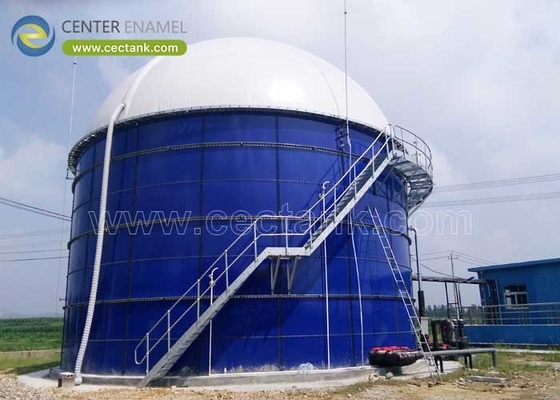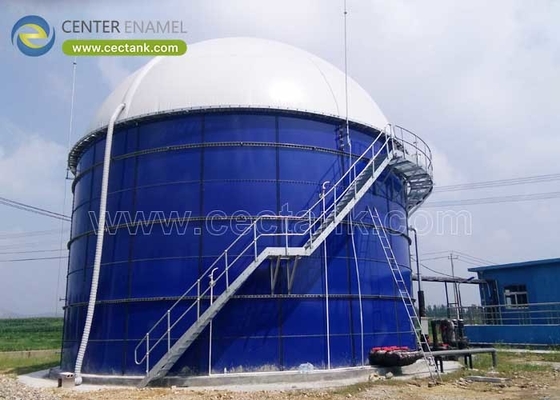-
Tangki Kaca Yang Dilelehkan Ke Baja (419)
-
Tangki Baja Tidak Berlemak (410)
-
Tangki epoxy yang terikat dengan fusi (424)
-
Tangki Baja Galvanis (321)
-
Atap Dome Aluminium (872)
-
Tangki penyimpanan air limbah (226)
-
tangki baja las (297)
-
Kapal Tekanan (295)
-
Pencernaan Anaerobik (201)
-
Tangki Air Industri (349)
-
Tangki baja berlapis kaca (180)
-
Tangki Baja Berbolt (181)
-
Tangki Penyimpanan Lumpur (115)
-
Tangki Penyimpanan Biogas (173)
-
Tangki Penyimpanan Leachate (133)
-
Tangki penyimpanan air pertanian (179)
-
Tangki Air Api (166)
-
Silos Gudang Gandum (130)
-
Proyek Biogas (349)
-
Proyek Pengolahan Air Limbah (270)
-
Atap Membran Ganda (223)
Mengapa Tangki Pendahuluan GFS Kunci untuk Pabrik Biogas yang Sukses
| Tempat asal: | CINA |
| Nama merek: | CEC TANKS |
| Sertifikasi: | ISO 9001:2008, AWWA D103 , OSHA , BSCI |
| Nomor model: | W |
| Kuantitas min Order: | 1set |
| Harga: | $5000~$20000 one set |
| Kemasan rincian: | Pe poly-foam di antara masing-masing dua pelat baja; palet kayu dan kayu |
| Waktu pengiriman: | 10-30 hari setelah setoran diterima |
| Syarat-syarat pembayaran: | L/c, t/t |
| Menyediakan kemampuan: | 60 set per bulan |
|
Informasi detil |
|||
| Tempat asal | CINA | Nama merek | CEC TANKS |
|---|---|---|---|
| Sertifikasi | ISO 9001:2008, AWWA D103 , OSHA , BSCI | Nomor model | W |
| Dasar: | Beton atau baja menyatu kaca | Ketebalan pelat baja: | 3mm hingga 12mm, tergantung pada struktur tangki |
| Atap tersedia: | Atap baja yang menyatu kaca, atap membran, atap aluminium, atap GRP | Mudah dibersihkan: | Halus, mengkilap, lembam, anti-adhesi |
| Fitur: | Ramah lingkungan, daya tahan | Tersedia CAPACTIY: | 20 m3 hingga 18.000 m3 |
| Menyoroti: | tangki biogas baja fusi kaca,tangki penyimpanan biogas pendahuluan,Tangki baja GFS untuk biogas |
||
Deskripsi Produk
Mengapa Tangki Pendahuluan GFS Kunci untuk Pabrik Biogas yang Sukses
Dalam dorongan global menuju ekonomi sirkular, pabrik biogas berdiri sebagai contoh inovasi yang bersinar, mengubah limbah organik menjadi sumber energi terbarukan yang kuat dan pupuk yang berharga. Pabrik biogas yang sukses adalah sistem yang sangat direkayasa, simfoni kompleks dari proses biologis dan mekanis yang bekerja dalam harmoni sempurna. Sementara digester anaerobik utama seringkali menjadi pusat perhatian, efisiensi dan keandalan sebenarnya dari seluruh operasi bergantung pada komponen penting, namun seringkali diabaikan: tangki pendahuluan.
Tangki pendahuluan ini, juga dikenal sebagai tangki pencampur atau penyangga, adalah pahlawan tanpa tanda jasa dari proses biogas. Ini adalah garis pertahanan pertama, tahap persiapan penting yang memastikan umpan yang stabil, konsisten, dan terhomogenisasi untuk digester utama. Dalam lingkungan yang menantang ini, di mana asam organik korosif dan peralatan pencampur yang kuat adalah norma, bahan tangki harus sangat tahan lama. Di Shijiazhuang Zhengzhong Technology Co., Ltd (Center Enamel), kami telah merekayasa solusi definitif. Tangki Pendahuluan Glass-Fused-to-Steel (GFS) kami adalah puncak dari pengalaman puluhan tahun, menyediakan sistem penahanan yang tidak hanya kuat dan tahan korosi tetapi juga sangat cocok untuk mengoptimalkan seluruh proses produksi biogas.
Sebagai produsen tangki penyimpanan terkemuka di seluruh dunia. Center Enamel dapat menyediakan tangki Glass Lined Steel (GLS), tangki epoksi terikat fusi, tangki baja tahan karat, tangki baja galvanis, dan atap kubah geodesik aluminium, Peralatan Proyek Air Limbah dan Biogas untuk pelanggan global.
| Konfigurasi Tangki Penyimpanan yang Disesuaikan | ||||
| Tangki penyimpanan | Volume | Atap | Aplikasi | Persyaratan Desain |
|
Tangki GLS Tangki SS Tangki Epoksi Terikat Fusi Tangki Baja Galvanis Tangki Baja Las |
<1000m³ 1000-10000m³ 10000-20000m³ 20000-25000m³ >25000m³ |
Atap ADR Atap GLS Atap Membran Atap FRP Atap Geladak Palung |
Proyek Pengolahan Air Limbah Proyek Air Minum Proyek Air Limbah Kota Proyek Biogas Proyek Penyimpanan Air Kebakaran Proyek Penyimpanan Minyak |
Sistem Suplai & Drainase Air Desain Tahan Gempa Desain Tahan Angin Desain Perlindungan Petir Desain Isolasi Tangki |
Pasokan Peralatan Proyek Pengolahan Air Limbah
| Peralatan Pra-perlakuan | Sistem Pemanfaatan Sumber Daya | Sistem Pengolahan Lumpur | Peralatan Lainnya |
|
Saringan Batang Mekanik Pemisah Padat-cair Pencampur Submersible |
Penampung Gas Sistem Boiler Kipas Pendorong Bio generator gas Sistem Obor Tangki Dehidrasi dan Desulfurisasi |
Perangkat Dosis Integrasi PAM Mesin Dehidrasi Lumpur Sekrup Sentrifus Pemisahan Lumpur |
Pompa Air Limbah Pengeruk Lumpur Pompa Air Limbah Submersible Pemisah Tiga Fasa |
Peran Kritis Tangki Pendahuluan dalam Pabrik Biogas
Umpan untuk pabrik biogas—baik itu limbah pertanian, sisa makanan, atau limbah kota—jarang merupakan bahan yang seragam atau konsisten. Ini adalah campuran heterogen yang dapat mengandung padatan besar, tingkat pH yang bervariasi, dan kandungan organik yang berfluktuasi. Memperkenalkan bahan mentah yang tidak konsisten ini langsung ke dalam digester anaerobik utama dapat menyebabkan fenomena yang dikenal sebagai "shock loading," yang dapat mengganggu keseimbangan mikroba yang halus, menghentikan produksi gas, dan bahkan menyebabkan seluruh pabrik gagal.
Tangki pendahuluan memecahkan tantangan mendasar ini dengan melakukan dua fungsi penting:
1. Homogenisasi dan Hidrolisis
Tangki pendahuluan bertindak sebagai langkah pra-perlakuan yang terkontrol. Di sini, mixer yang kuat menghomogenkan umpan mentah, memecah padatan besar dan menciptakan bubur yang seragam. Di sinilah juga proses yang dikenal sebagai hidrolisis dimulai, di mana polimer organik kompleks dipecah menjadi molekul yang lebih sederhana dan lebih mudah dicerna. Langkah pra-pemrosesan ini sangat penting karena membuat umpan lebih mudah diakses oleh mikroorganisme di digester utama, yang mengarah pada reaksi biogas yang lebih cepat, lebih efisien, dan menghasilkan lebih tinggi.
2. Penyangga dan Stabilisasi Aliran
Pabrik biogas, agar menguntungkan, harus berjalan terus menerus dan konsisten. Tangki pendahuluan bertindak sebagai penyangga, menghaluskan ketidakkonsistenan dalam pasokan umpan. Ini memastikan bahwa digester utama menerima aliran bahan yang terhomogenisasi yang stabil dan dapat diprediksi, melindunginya dari guncangan yang dapat disebabkan oleh perubahan mendadak dalam beban organik atau pH. Stabilitas ini secara langsung berkorelasi dengan hasil biogas yang lebih tinggi dan lebih konsisten, menjadikan tangki pendahuluan sebagai faktor penting dalam keberhasilan finansial pabrik.
Solusi GFS: Direkayasa untuk Lingkungan Biogas
Lingkungan di dalam tangki pendahuluan adalah lingkungan yang unik dan menantang. Hal ini ditandai dengan pencampuran yang kuat, kandungan padatan yang tinggi, dan adanya asam organik korosif. Bahan konvensional, seperti beton atau baja berlapis, sama sekali tidak mampu melakukan tugas tersebut. Beton berpori dan dapat rusak seiring waktu akibat serangan asam, sedangkan tangki baja berlapis hanya tahan lama seperti lapisannya, yang dapat dengan mudah rusak oleh abrasi terus-menerus dari peralatan pencampur.
Teknologi GFS memberikan solusi unggul dan tahan lama yang sangat cocok untuk lingkungan ini.
Ketahanan Korosi Tertinggi
Lapisan GFS memberikan penghalang permanen yang sangat keras yang sepenuhnya tahan terhadap asam organik yang sangat korosif dan bahan kimia lainnya yang ditemukan di tangki pendahuluan. Perlindungan permanen ini menjamin integritas struktural tangki selama masa pakai 30 tahun atau lebih, dengan hampir tidak perlu melapisi ulang atau perawatan yang mahal dan mengganggu. Daya tahan ini adalah landasan dari pabrik biogas yang andal, di mana waktu henti adalah beban finansial yang signifikan.
Daya Tahan untuk Pencampuran Tugas Berat
Tangki pendahuluan adalah pusat aktivitas mekanis. Lapisan GFS tidak hanya tahan terhadap bahan kimia tetapi juga sangat keras dan tahan lama, sehingga sangat tahan terhadap abrasi konstan dari mixer yang kuat dan kandungan padat dan abrasif dari umpan. Ini memastikan bahwa permukaan internal tangki tetap utuh dan berfungsi selama masa pakainya.
Tidak Ada Bau atau Risiko Lingkungan
Tangki GFS adalah sistem yang sepenuhnya tertutup. Panel yang direkayasa presisi, berbolt, dan sealant khusus mencegah keluarnya bau busuk yang terkait dengan limbah organik. Hal ini sangat penting untuk menjaga hubungan masyarakat yang baik dan memastikan kepatuhan terhadap peraturan lingkungan yang ketat. Integritas tangki GFS juga menghilangkan risiko kebocoran, melindungi lingkungan sekitar dari kontaminasi.
Keuntungan Konstruksi Berbolt
Metode konstruksi berbolt kami menawarkan keuntungan yang signifikan dibandingkan tangki konvensional yang dibangun di lapangan. Setiap panel tangki dibuat presisi, dilapisi, dan dikontrol kualitasnya di basis produksi kami seluas 150.000m² yang canggih. Ini memastikan kualitas yang konsisten dan hasil akhir yang sempurna. Panel kemudian diangkut ke lokasi dan dirakit dengan cepat dan aman, secara drastis mengurangi jadwal konstruksi dan biaya tenaga kerja. Pendekatan modular ini sangat bermanfaat untuk proyek-proyek kompleks seperti pabrik biogas, di mana kecepatan dan presisi sangat penting.
Perbedaan Center Enamel: Sejarah Otoritas Global
Memilih mitra untuk infrastruktur penting membutuhkan lebih dari sekadar produk yang bagus; itu membutuhkan warisan keahlian yang terbukti dan komitmen terhadap standar global. Sejarah, skala, dan sertifikasi Center Enamel membedakan kami sebagai pemimpin global sejati.
Semangat Perintis dan Warisan Inovasi
Kisah kami dimulai pada tahun 1989 ketika kami memulai misi untuk menghadirkan solusi penyimpanan yang unggul ke pasar. Kami adalah produsen pertama di China yang secara independen mengembangkan teknologi Glass-Fused-to-Steel. Semangat perintis ini telah mengarah pada akumulasi hampir 200 paten enamel, termasuk teknologi enamel ganda terobosan kami, yang menjamin perlindungan komprehensif. Warisan inovasi ini memastikan bahwa produk kami tidak hanya dibuat sesuai dengan standar saat ini, tetapi juga berada di garis depan industri.
Skala Tak Tertandingi dan Kemampuan Terbukti
Basis produksi baru kami, yang mencakup lebih dari 150.000m², adalah salah satu yang terbesar dan paling maju di industri. Kapasitas tak tertandingi ini memungkinkan kami untuk menangani proyek dengan ukuran dan kompleksitas apa pun. Prestasi kami yang memecahkan rekor, seperti membuat tangki GFS terbesar di Asia (32.000m³) dan tangki GFS tertinggi (34,8m), adalah bukti nyata dari kemampuan kami untuk menangani proyek yang paling ambisius dan menuntut.
Penerimaan Global dan Kepatuhan yang Ketat
Produk kami dipercaya di seluruh dunia. Tangki berbolt kami telah diekspor ke lebih dari 100 negara, termasuk pasar yang sangat diatur di AS, Australia, dan Kanada. Kepercayaan luas ini merupakan hasil langsung dari kepatuhan ketat kami terhadap standar internasional. Proses manufaktur dan rekayasa kami sepenuhnya sesuai dengan standar seperti AWWA D103-09 dan ISO 28765, memberikan jaminan kepada klien bahwa tangki kami secara struktural sehat dan andal. Komitmen kami terhadap kualitas semakin diperkuat oleh sertifikasi ISO 9001 kami.
Solusi Holistik
Kami memahami bahwa pabrik biogas adalah sistem holistik. Itulah sebabnya kami juga menyediakan atap kubah geodesik aluminium berkualitas tinggi dan aksesori penting lainnya. Atap ini adalah pelengkap yang sempurna untuk tangki GFS kami, menyediakan penutup ringan, tahan korosi, dan kedap gas yang penting untuk penangkapan biogas yang efisien. Pendekatan holistik ini memastikan bahwa kami adalah mitra dalam seluruh proyek, bukan hanya pemasok satu komponen.
Kasus Ekonomi untuk Tangki Pendahuluan GFS
Meskipun biaya awal tangki pendahuluan GFS mungkin menjadi pertimbangan, nilainya menjadi jelas ketika Anda melihat total biaya kepemilikan selama masa pakai aset.
Output Biogas yang Dioptimalkan: Tangki pendahuluan GFS adalah investasi langsung dalam efisiensi dan stabilitas seluruh pabrik Anda. Dengan memastikan umpan yang konsisten, ia memaksimalkan hasil biogas, yang secara langsung diterjemahkan ke dalam aliran pendapatan yang lebih tinggi dan lebih konsisten.
Total Biaya Kepemilikan yang Lebih Rendah: Daya tahan dan ketahanan korosi yang unggul dari teknologi GFS menghilangkan kebutuhan akan perawatan, perbaikan, atau penggantian dini yang mahal.
Kontinuitas Operasional: Tangki yang andal dan perawatan rendah berarti tidak ada waktu henti yang tidak terduga, yang sangat penting untuk pabrik biogas yang beroperasi terus menerus.
Sebagai penyedia sistem penahanan dan penutup yang komprehensif, kami menawarkan Dukungan Teknis EPC (Rekayasa, Pengadaan, Konstruksi) penuh, memastikan proyek yang mulus dari desain dan rekayasa awal hingga panduan instalasi di lokasi dan layanan purna jual jangka panjang.
Tangki pendahuluan GFS lebih dari sekadar wadah penahanan; itu adalah investasi penting dalam efisiensi, profitabilitas, dan umur panjang pabrik biogas Anda. Dengan memilih mitra dengan keahlian yang terbukti, kualitas bersertifikat, dan otoritas global dari Center Enamel, Anda memilih solusi yang direkayasa untuk membuka potensi penuh proyek biogas Anda.




